Sahiyo to release nine new Voices to End FGM/C digital stories
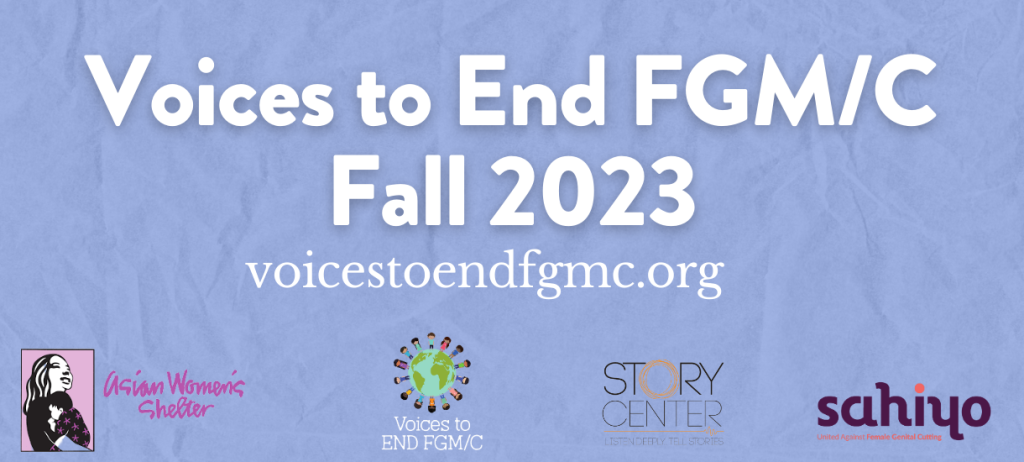
“Everything I learned from the workshop was gold to me. I enjoyed all the sessions and the new skills I acquired in creating a digital story (…) about a scar. A scar that my primary duty bearers believed was necessary to have in order to be labeled as the “purified” girl, for marriage, as opposed to being referred to as a “solimaa”, the uncut girl. A scar that will resemble a fresh wound for the rest of my life. Here I am today, after being silent for many years. I now am not afraid to talk in public about stopping FGM/C.I wish I didn’t have this scar. I wish you didn’t either. But we don’t have to be silent about it.” ~Amie Kujabi, Voices Storyteller Amie is one of nine storytellers who participated in the latest cohort of the Voices to End FGM/C project. Each participant bravely created videos sharing their experiences with female genital mutilation/cutting (FGM/C), with the ultimate goal of ending this harmful practice. And starting on January 17th, Sahiyo will begin sharing these short videos along with reflection blogs from each storyteller. A collaboration between Sahiyo, StoryCenter, and Asian Women’s Shelter (AWS), every year the Voices to End FGM/C project brings together survivors, activists, and others impacted by FGM/C from around the world. Together, these storytellers heal by connecting and sharing their stories, while growing as leaders. So far, we’ve held seven workshops in the past six years, supporting over 70 courageous souls from more than 19 countries to share their experiences. Along with being therapeutic, these stories are tools we use to plant the seeds of greater social change. Through watching these videos, we’ve educated governments about the need for policies that protect future generations of girls from FGM/C. The videos also teach healthcare professionals and other service providers about the impact of this practice, so they can better help survivors. “I just hope people that receive this message understand how wrong this is and if there’s anyone who’s in my shoes who’s lost a friend this way or someone they loved, that way they can get up and advocate and they can start speaking against this practice. I hope when they receive this message, they realize the danger.” ~Gugu Makhari, Voices Storyteller We’ll be updating the blog with the videos and reflection blogs from this year’s cohort when they’re available very soon. In the meantime, you can support storytellers from past cohorts by watching their videos on this playlist. For further questions, contact Aries at aries@sahiyo.org.
Musuya (Womanhood)
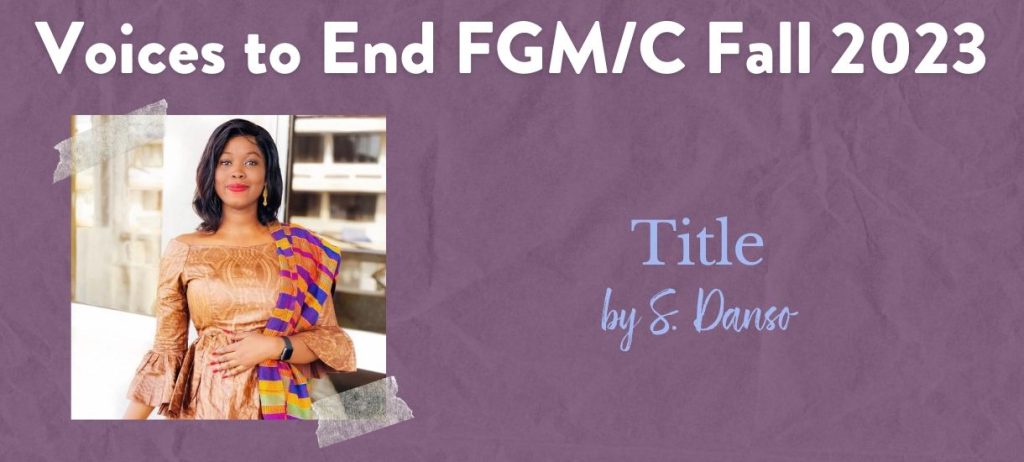
“I believe they don’t really know what it is and how it is conducted, the procedures, and the negative impact that it has… It will be easy to say ‘don’t ban FGM’ when you don’t know what happened in there.” In S Danso’s country, men are working in Parliament to repeal the ban on female genital mutilation (FGM). However, S feels that her story of undergoing FGM and its impact will make those who wish to perform FGM on their loved ones reconsider. She felt it was important to be a part of the growing number of voices raised against FGM, and the Voices to End FGM/C digital storytelling workshop provided an opportunity to do so on an international level. When asked why she wanted to attend the workshop and share her story of FGM, S’s answer was clear: raising awareness. She chose to tell the story of her experience undergoing the cut, with exact details of the ceremony and circumcision that are not well known. “If you are educating people, it is important to get right to the point.” The Voices to End FGM/C workshop was also impactful to S in multiple ways, as she learned from the other participants, who came from different parts of the world. In particular, other survivors talked about how to deal with the “post-FGM whatsoever.” “Things happen and you don’t know how to deal with it,” S explains of her experience as a survivor. However, people at the workshop “explained their healing process” as well as “how to do advocacy work and better convey [a] message to the people.” “Hearing their stories… has motivated me to come up and give out my story. I feel so empowered and confident hearing all of their stories.” S’s workshop experience represents that there is power in numbers, and in creating safe spaces where survivors can come together to share, to heal, and to advocate for change. [youtube url=”https://www.youtube.com/watch?v=iTN6j2JINnE”] S Danso is a Gambian National and a legal practitioner with over eight years of experience in community work and activism focusing on equality, inclusion and social justice. Currently, she is the secretary-general of One African Women’s Forum, an international organization that focuses on promoting women’s rights based in Nigeria. Sirra has impressed all with her warmth, wisdom, and kindness, but above all, her intellectual curiosity and a keen interest in social justice and equality remain exceptional.
It’s a Marathon, Not a Race
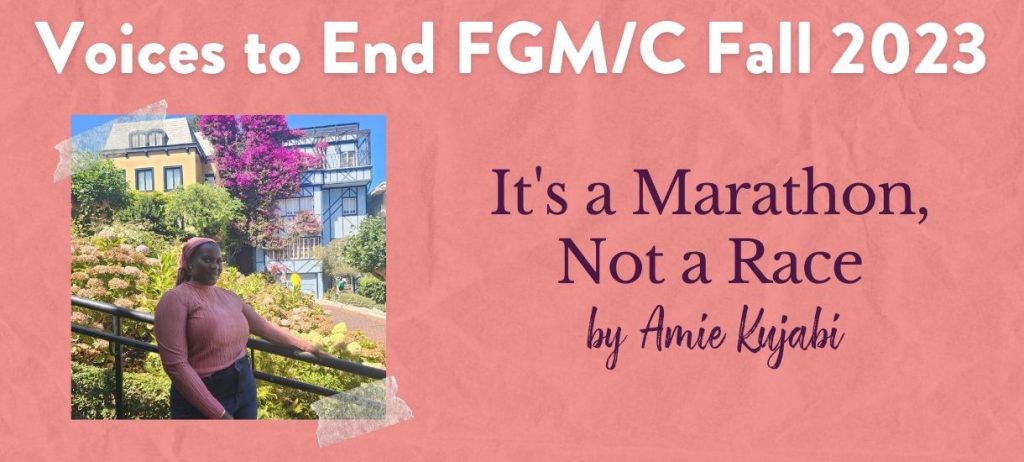
By Amie Kujabi I am an FGM/C survivor. For the past two decades, my advocacy on FGM/C has been centered around other survivors and girls at risk—but never have I shared my story. A story that shaped the trajectory of my childhood and marked the beginning of a long…long…lonely self-awareness journey to an unknown destination. I took a bold step and shared my story as an FGM/C survivor with people outside of my close-knit circle by giving testimony during an anti-FGM/C bill hearing with policymakers in Washington State. It occurred to me that there is a need for survivors to share their unique stories to raise awareness and encourage action-oriented commitments from different stakeholders. When the opportunity to participate in the digital storytelling workshop presented itself, I challenged myself to be part of the amplified voices. Voices that not only narrate similar stories about FGM/C but also give a human face to FGM/C. In our digital world, people are moved not just by words, but also by actions and visual representation. Since FGM/C is not seldom talked about—a taboo in our communities—it was important for my story to be told in a captivating way, to change the narrative. My digital story narrates the experiences I remember the most as a six-year-old girl who was taken to another country (Senegal) for FGM/C, under the disguise of spending summer break with my cousins and family. And so it happened: I was cut and introduced into “womanhood,” as they claimed. I later understood it as “vocational cutting” at the peak of my self-awareness journey as an adult and advocate. My story highlights the issues I faced—and I continue to struggle with. As a survivor, I struggled a lot, with my relationships growing up and in adulthood. Though this experience took me on an unknown journey, it landed me on the shores of “fighting for what is right”. That’s what propelled me into my work as a girl’s and women’s rights advocate. Everything I learned from the workshop was gold to me. I enjoyed all the sessions and the new skills I acquired in creating a digital story. From learning how to write a straight-to-the-point short story, creating and editing a digital story, being in a space with other survivors and allies, sharing our stories, and most importantly, finding support in each other. It made me feel seen and understood in my multifaceted emotions and struggles that the rest of the world may never see on a day-to-day basis. The workshop was an amazing experience, and I want more women (and others ) to be part of this great network. Together we can create more digital stories that amplify voices against this horrendous practice. I want my story to captivate the attention of people from different walks of life. I hope that it will inspire survivors to share their stories, allies to render their support when and where it is needed, and even those on the other side of the table to finally resist this age-old tradition that harms girls. My hope is to see every state and nation have solid anti-FGM/C policies in place. I know for a fact that these laws concentrate on protecting girls at risk of being subjected to FGM/C, but I hope to see the implementation of policies that would support survivors of FGM/C as well. I hope you will find the time to watch my short digital story. A story about a scar. A scar that my primary duty bearers believed was necessary to have in order to be labeled as the “purified” girl, for marriage, as opposed to being referred to as a “solimaa”, the uncut girl. A scar that will resemble a fresh wound for the rest of my life. Here I am today, after being silent for many years. I now am not afraid to talk in public about stopping FGM/C. If there had been laws when I was a child, things would have been different. I was able to convince another family member to have her girls cut. And my mother is finally on board with me. But all I can think is that I failed you. I wish I didn’t have this scar. I wish you didn’t either. But we don’t have to be silent about it. [youtube url=”https://www.youtube.com/watch?v=Kfp7DQXzjlk”] Amie Kujabi was born and raised in The Gambia, a small country in West Africa. She is very passionate about development issues, especially from a grassroots level, but also, about what development should entail at a global scale. Amie is a human rights advocate, as well as a champion for women and girls’ rights and empowerment. She is also the co-founder of Think Young Women, a young women-led organization in The Gambia. Amie is an FGM/C survivor and anti-FGM/C advocate currently residing in Washington State. As a member of the Washington Coalition to End FGM/C, Amie helped Washington become the 41st state to enact anti-FGM/C legislation. Amie is also a recent graduate of Global Development Studies and French and Francophone Studies and aspires to contribute immensely to the development of her community, state, and at the international level.
Turning Grief into Purpose
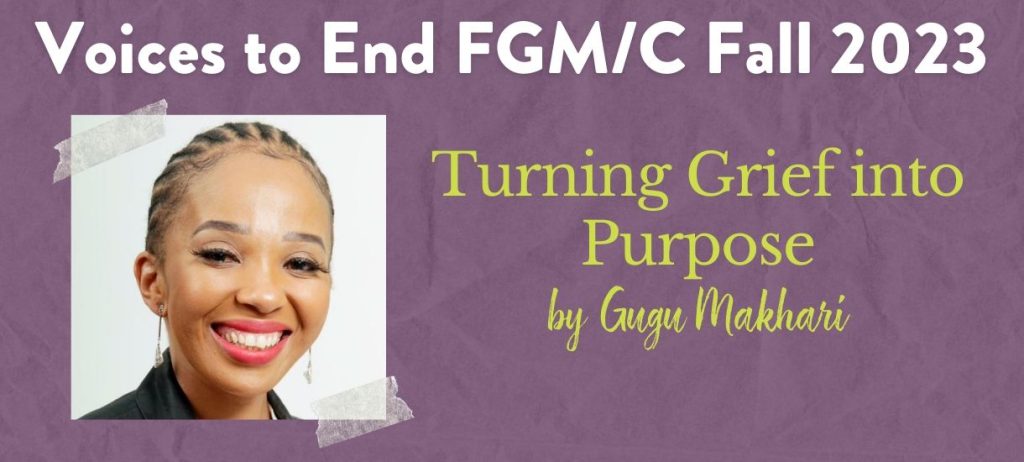
Gugu Makhari learned about the Voices to End FGM/C digital storytelling project through a friend and through personal research online. She wanted to share a story about how both female genital cutting (FGC) and male circumcision are normalized in her community. Those who undergo these harmful practices are often celebrated after they are cut. “After a couple of months they come back and then we have this big ceremony where everyone comes out from different neighborhoods all together and they will go in a group and sing along cheer for them, so we’re so used to that.” But, this tradition had a painful impact on Gugu. She knew one girl who underwent FGC and never spoke to her again; and another friend who underwent male circumcision and died from the practice. These experiences affected her for life, and she still feels the loss of her close friend for the sake of tradition. “I lost a friend and I always wanted to express myself… but I didn’t know how and I didn’t really have a platform to do that.” The Voices workshop allowed her to have the space to tell her story for the first time. Gugu described her friend who died as: “The only person I had at the time when I was going through a lot at home, that understood me and who was really supportive and really loved me genuinely. He was very close to me. So yeah, that hurts.” Learning about her friend’s death was difficult for Gugu, as their relationship was something she cherished deeply. “When I found out about his death. I went to his home and his mom [told] me what happened, but she didn’t tell me in detail. I was still a little young, in our culture…you accept what you are told and that’s usually it. I’m not gonna be asking his mom why you let this happen.” The unknown circumstances of her friend’s death frustrated Gugu, not knowing what happened, and why a practice with fatal consequences occurred in her community. This is what inspired her to create a story in his memory. For her digital story, Gugu created art pieces that reflected the fun and joy that radiated from her friend. “I was expressing myself using the art… it helps in so many ways. It was… a kind of healing, I don’t know how to say it. But it also helped because it opened another door for me to really now use art as a form of expression for human rights. The art was about the culture where he came from. I have some drums that I drew in different sizes so that it resembles being heard amplifying your voice louder and louder and louder” The Voices workshop provided her a cathartic space to tell her story, and to learn the stories of others who had undergone harmful practices like FGC. “I’ve learned a lot about being confident and I learned a lot about sharing your story, how it can change other people’s lives. I’ve been to so many workshops and events, but I didn’t even feel like I was necessarily at a workshop. It felt like I was with family. And I couldn’t believe that people have gone through so much pain. Hearing other people’s stories made me realize that there’s more for us to fight for in the world. And even if I was not directly affected, it helped for me to be there as well as a voice.” Gugu’s choice to share her story about her friend highlights how connections can be made between the movement to end FGC and other harmful practices justified by tradition. “I just hope people that receive this message understand how wrong this is and if there’s anyone who’s in my shoes who’s lost a friend this way or someone they loved, that way they can get up and advocate and they can start speaking against this practice. I hope when they receive this message, they realize the danger.” [youtube url=”https://www.youtube.com/watch?v=YlO7asmsWxA”] Gugulethu ‘Gugu’ Makhari is a dynamic force dedicated to championing women’s rights, human rights, and youth empowerment on a global scale. As the Chair of the Commission on Women’s Rights and Human Rights, she serves as a passionate advocate for change through her active involvement with the Youth Council for Global Sustainable Development Goals Inc NGO. Her commitment to creating a better world extends beyond borders, as she has also taken up the role of USA National Organizer and Coordinator for the “March For Our Planet” movement, catalyzing action for environmental sustainability. Gugu’s multifaceted expertise and unwavering dedication make her an inspiring force driving positive change in diverse spheres.
Resilience
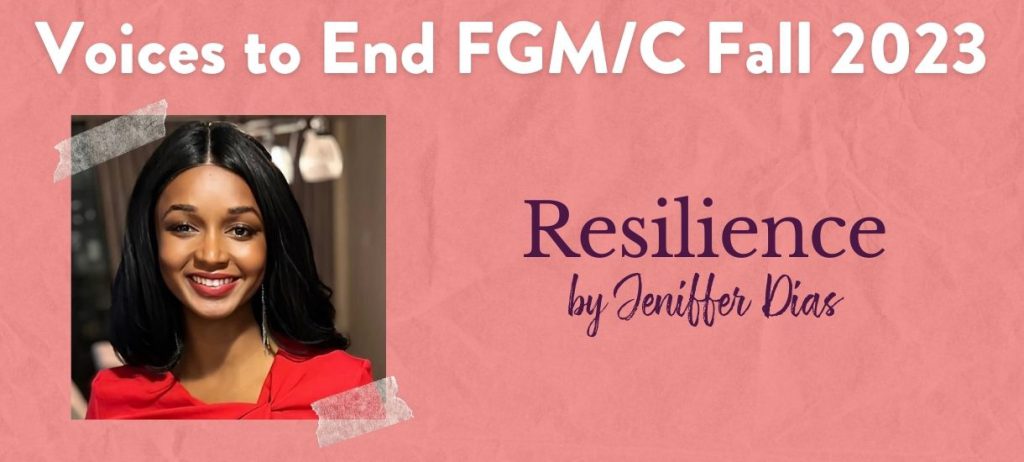
By Jeniffer Dias When I learned I had an opportunity to participate in the Voices to End FGM/C workshop, I first talked with my mentor, Bárbara Oliveira, and told her that I would like to talk about myself. She told me: “This is the moment to remove your ‘mask’ and talk about you, about who you are, and how strong you have been with being alone all your life. And how you protected yourself from being afraid, from being rejected, or from people trying to do what your father did to you. You are far away from that and free.” So I decided to talk; talk about what I did, and still do to protect myself from my past. And I decided to talk about my resilience, and how it has pushed me in my studies, work, and everyday life, to not let others hurt me again. As I usually say, resilience is the ability to accept that life has four seasons, and no matter how difficult and cold winter is, it will end. And then the spring comes, which makes me forget all the suffering that the cold caused me. Then I start to contemplate the flowers, the green fields, the birds chirping, and the rebirth of life. For me, resilience is my inner strength, my faith, the engine that exists within me that does not allow me to stop or remain shaken for a long time in the face of complicated situations; in the eyes of others, it would be impossible for me to find a way to survive or get out of it. The decision to talk wasn’t easy, however. Hours before the first virtual meeting, I was so nervous. I did a lot of things to distract myself because my mind just didn’t want to accept having to talk about my terrible past. I was also worried because the last time I opened up to people about myself, they started treating me differently. So when I started talking I was afraid, but when the meeting finished I felt at peace with myself. I learned a lot during my workshop experience, especially about how powerful women can be stronger together. I also learned that, in working together, our voices can have an impact, improving and changing others’ lives. I felt welcomed and part of the group; everybody treated me very well. I felt love, peace, at home, and all these things helped me to create my story. I am proud of my ability to use the bad things that I had to live with during my childhood (psychological, emotional aggression, humiliation, and abandonment), and transform them into love, affection, and care for others. Creating my story was like officially removing any relationship from being afraid of being rejected. It was like a shout of freedom. I would like my story to have a positive impact. I want my story to inspire others to share the message that everything is possible when you believe in yourself. Regardless of what others say or do to stop your dreams, you can accomplish them. My goals are to be an ambassador at the United Nations, and to work with children’s rights, to protect them against physical and emotional violence. I also want to have a family, to travel, and to be happy. I believe I can accomplish these goals with determination and Resilience. [youtube url=”https://www.youtube.com/watch?v=DPZFTU9Lzto”] Jeniffer Dias, is Portuguese born in Guinea-Bissau. Jeniffer graduated from Universidade Nova de Lisboa, where she studied Political Science and International Relations. She has a strong comprehensive view of diplomacy, international relations, and human rights. Currently, she is carrying out research for her Master’s degree in International Relations with a focus on Child Marriage.
